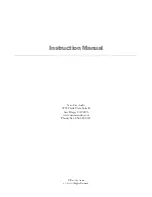
42
– It is recommended that you record a file at 640 x 480
resolution. (If a file has been recorded at a resolution of
more than 640 x 480, it will take a long time to be shown.)
– This System can play only baseline JPEG files*.
Progressive JPEG files* or lossless JPEG files* cannot
be played.
* Baseline JPEG format:
Used for digital cameras,
web, etc.
Progressive JPEG format: Used for web.
Lossless JPEG format:
An old type and rarely used
now.
• For MPEG-1/MPEG-2 playback...
– This System can play back MPEG-1/MPEG-2 files with
the extension code <.mpg> or <.mpeg> (regardless of the
letter case—upper/lower).
– The stream format should conform to MPEG system/
program stream.
– 720 x 576 pixels (25 fps)/720 x 480 pixels (30 fps) is
recommended for the highest resolution.
– This System also supports the resolutions of 352 x 576/
480 x 576/352 x 288 pixels (25 fps) and 352 x 480/480 x
480/352 x 240 pixels (30 fps).
– The file format should be MP@ML (Main Profile at
Main Level)/SP@ML (Simple profile at Main Level)/
MP@LL (Main Profile at Low Level).
– Audio streams should conform to MPEG1 Audio Layer-2
or MPEG2 Audio Layer-2.
• For ASF playback...
– This System can play back ASF files with the extension
code <.asf> (regardless of the letter case—upper/lower).
– This System supports ASF files whose resolution is
352 x 288 pixels or less.
– Some recorded files may not be able to played back
depending on file characteristics, kind of digital still/
video cameras, or recording conditions.
• For DivX playback...
– The System supports DivX 6.x, 5.x, 4.x and 3.11.
– When making a disc, use the UDF-Bridge format.
“Multi-border” is not supported.
– The System supports DivX files whose resolution is 720
x 480 pixels or less (30 fps), and 720 x 576 pixels or less
(25 fps).
– Audio stream should conform to Dolby Digital, MPEG1
Audio Layer-2 or MPEG Audio Layer-3 (MP3).
– This System can play back DivX files with the extension
code <.divx> <.div> <.avi> (regardless of the letter
case—upper/lower).
– The System does not support GMC (Global Motion
Compression).
– The file encoded in the interlaced scanning mode may
not be played back correctly.
Daily Operations—Sound & Other Adjustments
(see pages 13 to 16)
Adjusting the Speaker Output Level :
• The channel level cannot change during Mic Mixing,
Vocal Masking or Karaoke Scoring.
Reinforcing the Bass Sound:
• The adjustment for the subwoofer level does not affect the
sound through the headphones.
Applying an Optimal Bass Sound Effect—VARIO BASS
• If you plug in a microphone and Mic Mixing is activated,
the System will automatically switches the mode to
LITE.n.EASY even if the mode is set to OFF.
Creating Your Own Sound Modes —User Mode:
• When you unplug the AC power cord or if a power failure
occurs, the User Mode settings may be erased in a few
days. If this happens, set the User Modes again.
Selecting the Surround Modes:
• Dolby Pro Logic II Modes: Dolby Pro Logic II Mode is a
multi-channel playback format to convert 2-channel
sources into 5.1-channels. Dolby Pro Logic II reproduces
spacious sound from original sound without adding any
new sounds or tonal colorations.
• While you use the headphones, the Surround Mode is
canceled temporarily.
• Some DVD Audio discs prohibit downmix. While playing
back such a disc...
– You cannot change the Surround Mode.
– The System plays back the left front and right front
signals when you have selected “STEREO” for the
Surround Mode or when you use the headphones.
• Dolby PL II MUSIC/MOVIE take no effect to MPEG-1/
MPEG-2/ASF/DivX files.
Setting the Clock:
• “0:00” will flash on the display until you set the clock.
• The clock may gain or lose 1 to 2 minutes per month. If this
happens, reset the clock.
Unique Video Disc/File Operations
(see pages 17
to 19)
Selecting the Audio Track:
• On some disc/file, you cannot change audio languages
while playing back.
Playing Back Bonus Group:
• You cannot select a track in the bonus group for Program
Play.
Special Picture Playback:
• During slow-motion playback, no sound will be
reproduced.
• While zoomed in, the picture may look coarse.
Advanced Playback Operations
(see pages 20 to 22)
Programming the Playing Order—Program Play:
– While programming steps...
Your entry will be ignored if you have tried to program an
item number that does not exist on the disc (for example,
selecting track 14 on a disc that only has 12 tracks).
– For SVCD/VCD/CD loaded on the other tray than the
current one, the System may prompt for the group
number entry as well; however, these entries will be
ignored during playback.
DX-U10_8[U].book Page 42 Monday, March 26, 2007 2:24 PM
















































